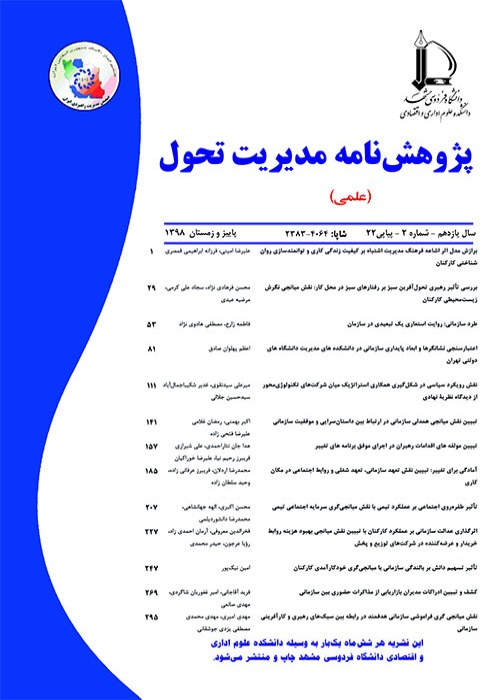Readiness for Change: Explaining the Role of Organizational Commitment, Job Commitment and Social Relations in the Workplace
To survive in today's ever-changing environment that technology and communication networks are constantly evolving, organizations are faced with challenges such as competition, development, stability, merger and acquisition, and reengineering of work processes. These factors cause organizations to reconsider their strategy, structure, policies, operations, processes, and culture. In this situation, organizational change is inevitable. To perceive employees readiness for change can serve as a guideline for the organization’s leaders to determine the best way of implementing needed changes. Since organizations and especially universities are fields for human activities, their destiny is tied up with change. Change plans at different levels of universities usually fail because they neglect success factors such as employees’ readiness for change and its affecting variables. Considering the above, this research seeks to answer the question that whether organizational commitment, job commitment, and social relations in the workplace affect employees’ readiness for change.
Organizational change is of the most important factors for organizations to survive by optimizing organizational performance. Change may worry employees about ambiguous and unknown situations and consequently lead to threat feelings, uncertainty, alienation, and anxiety. On the one hand, change is a human phenomenon and it is necessary for organizations to be aware of employees' perceptions of change before implementing it. Employees are the human capital that has the most impact on the organization’s survival on the other. A key aspect of organizational change is the readiness of organization members for change. Readiness for change is a construct that creates positive behaviors and attitudes in employees toward new ideas. Therefore, scholars are required to identify affecting factors of employees’ readiness for change in line with understanding their attitudes and beliefs toward the organizational change. Reviewing the change management literature indicates the association of organizational commitment, social relations in place of work, and job commitment with employees’ readiness for change. If employees are committed to their job and organization, they will have a positive attitude toward change and establish positive social relations that lead to their readiness to accept changes.
This is a descriptive-correlational study and its statistical population is comprised of 744 employees in Bu-Ali Sina University of Hamadan. By conducting proportional stratified random sampling based on Cochran’s formula, 184 employees were selected as the research sample. Needed data was gathered using a questionnaire encompassing three standard measures of attitude toward change, job stress, and organizational commitment. The opinions of management and education experts confirmed the questionnaire’s validity, and its reliability was investigated by using Cronbach’s alpha coefficient. Gathered data was analyzed in SPSS and LISREL software.
Research results indicated that the effects of organizational commitment, job commitment, and social relations on employees’ readiness for change are positive and significant. Therefore, organizational commitment, job commitment, and social relations are of the factors that university managers should consider to increase the employees’ readiness for change.
Organizational change has become an inclusive phenomenon in organizations due to pressures of the external and internal environments. University is an essential institution for development process of any country that facilitates the economic, social, political, and cultural development of society. The higher education system is faced with factors such as reduced rate of graduates' employment, increased number of students, demand for more effective training, globalization, increased competitiveness, and market orientation. For this reason, it is necessary for a higher education system to be ready for changes and consider their affecting factors. Organizational commitment is of the factors that are significantly associated with readiness for change. If an employee is committed to the organization, they devote themselves to the organization and establish a strong belief on and commitment to change plans. Job commitment can create positive emotions and thoughts toward change. If an employee is satisfied with their job, they may exert positive feelings and attitudes toward organizational changes. Social relations in the workplace are focused on employees’ feelings, attitudes, and perceptions and affect their readiness for change. Accordingly, when deciding to implement organizational changes in the university, managers should pay more attention to employees’ readiness for change and its affecting factors such as organizational commitment, job commitment, and social relations in the workplace.
- حق عضویت دریافتی صرف حمایت از نشریات عضو و نگهداری، تکمیل و توسعه مگیران میشود.
- پرداخت حق اشتراک و دانلود مقالات اجازه بازنشر آن در سایر رسانههای چاپی و دیجیتال را به کاربر نمیدهد.



